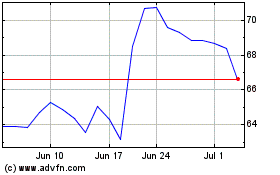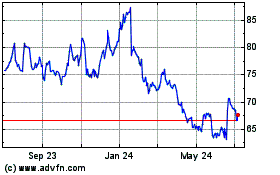By Stephanie Armour and Joseph Walker
Health-care leaders are expressing concern over how the Trump
administration plans to distribute the promising coronavirus drug
remdesivir, saying they are in the dark about the allocation
criteria being used and are worried it isn't based on need.
Some hospital officials say they have been informed they can't
get the drug since the federal government took over its allocation
following the Food and Drug Administration's emergency use
authorization on May 1.
"Patients are going to die if we can't get access," said Dr. Amy
Compton-Phillips, chief clinical officer at Providence St. Joseph
Health in Seattle. "We need transparency on who is getting
remdesivir."
That lack of clarity surrounding the drug's allocation is
prompting health-care professionals to question whether remdesivir
is being distributed based on need or other considerations.
Providence Health was involved in national clinical trials to
test remdesivir in patients with severe and moderate Covid-19, the
disease caused by the new coronavirus. Officials there now say they
can no longer get the drug for patients because they haven't been
selected by the government to receive it.
Health and Human Services and the Federal Emergency Management
Agency, which are handling allocation, didn't immediately return
emails seeking comment.
"We have sick patients now," said Dr. Michael G. Ison, at
Northwestern University Feinberg School of Medicine in Chicago,
adding that they can't get the drug. "It's a mess. The critical
issue is that there has been a plan put in place and no clarity put
in place."
Gilead Sciences Inc., which developed remdesivir, has pledged to
donate 1.5 million doses -- or enough to treat up to about 190,000
patients -- that it expects to manufacture by the end of this
month. Supply of the drug is limited, and some analysts predict
shortages relative to demand this summer. Gilead says it aims to
produce enough remdesivir to treat more than one million patients
by the end of 2020.
After receiving emergency use authorization, the company said it
isn't playing a role in deciding how to allocate the donated supply
of the drug in the U.S.
"Gilead is not deciding which hospitals will receive
remdesivir," a Gilead spokesman said in an email on Thursday.
Because remdesivir has only been shown to be effective in severely
sick patients, and is in short supply, "hospitals with intensive
care units and other hospitals that the government deems most in
need will receive priority in the distribution of remdesivir."
The University of California San Francisco's hospital system
learned this week that it wasn't chosen to receive the drug after
calling AmerisourceBergen Corp., says Peter Chin-Hong, an
infectious-disease specialist and professor of medicine at the
university. Dr. Chin-Hong says his hospital, UCSF Medical Center,
typically has around 20 Covid-19 patients receiving inpatient
treatment, including those referred from local hospitals.
Amerisource, a drug wholesaler, is the exclusive distributor of
remdesivir, according to Gilead.
At the moment, UCSF doesn't have patients who it would like to
treat with remdesivir but can't, but Dr. Chin-Hong worries that
could change quickly. "It's just the uncertainty," says Dr.
Chin-Hong. "We've been blessed to have it, but the well is going to
run out soon and we don't know when it's going to rain again."
Dr. Chin-Hong and his colleagues have been surveying doctors at
hospitals around the U.S. caring for Covid-19 patients on whether
they've been selected to receive the drug and posting the results
online.
So far about 25 hospitals asked have said they were selected,
Dr. Chin-Hong says.
UCSF still has a supply of remdesivir for patients in a
so-called expanded access program that allows the drug to be used
by very sick patients on ventilators who aren't eligible for
clinical trials. Gilead set up the program before the FDA's
emergency authorization, and was diligent in supplying the drug for
those patients, Dr. Chin-Hong says.
This week, a Gilead contractor told UCSF that it could only use
that supply for patients enrolled in the expanded access program,
and that any drug left over would have to be destroyed, Dr.
Chin-Hong says. The instructions were logical from a regulatory
perspective, he says, but were surprising at a time when "this drug
is treated like gold."
Gilead didn't respond to a request for comment.
The National Institute of Allergy and Infectious Diseases said
that a preliminary analysis of its study showed that hospitalized
Covid-19 patients taking remdesivir had a speedier recovery than
patients taking a placebo -- though the reported benefit was
moderate, with remdesivir patients recovering in 11 days, or four
days faster than the placebo group.
In an emailed statement, an Amerisource spokesman said
"decisions on which hospitals and the quantity of the product they
will receive are being made by the government," and Amerisource is
working to "move any product we receive from Gilead in keeping with
the government's directives."
Amerisource is distributing remdesivir to hospitals across the
U.S. "regardless of whether they are AmerisourceBergen customers,"
the spokesman said. Hospitals designated by the U.S. government to
receive donated remdesivir will be contacted directly by
Amerisource, according to a notice on the company's website.
"From what we can tell, it's not based on need," said Helen
Boucher, division of geographic medicine and infectious diseases
chief at Tufts Medical Center. She said information on the clinical
trial also needs to be shared by the federal government to help
guide medical decisions.
The plan for distributing remdesivir should be transparent and
based on state and regional case data and hospitalization rates,
according to a letter sent Thursday to Vice President Mike Pence
from the Infectious Diseases Society of America and the HIV
Medicine Association.
The groups, which represent over 12,000 infectious diseases and
HIV physicians, scientists, and others, said allocation should be
on a regional basis that's equitable within the region to states
and within states to hospitals.
This will be imperative to ensure appropriate patient access and
"reduce the significant health disparities and adverse outcomes
already experienced by Black Americans, Latinx communities and
other populations, " the letter says.
Write to Stephanie Armour at stephanie.armour@wsj.com and Joseph
Walker at joseph.walker@wsj.com
(END) Dow Jones Newswires
May 07, 2020 19:29 ET (23:29 GMT)
Copyright (c) 2020 Dow Jones & Company, Inc.
Gilead Sciences (NASDAQ:GILD)
Historical Stock Chart
From Mar 2024 to Apr 2024

Gilead Sciences (NASDAQ:GILD)
Historical Stock Chart
From Apr 2023 to Apr 2024
